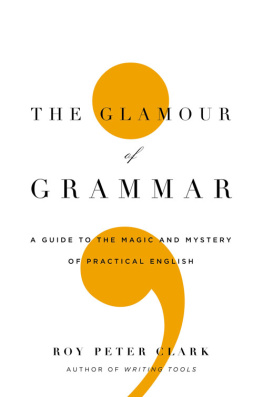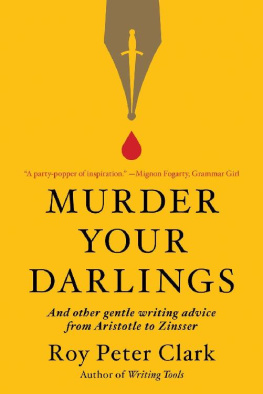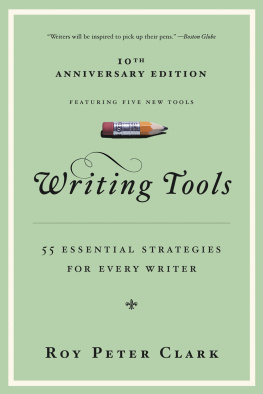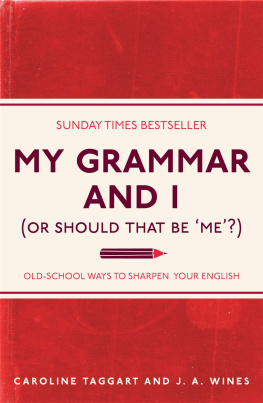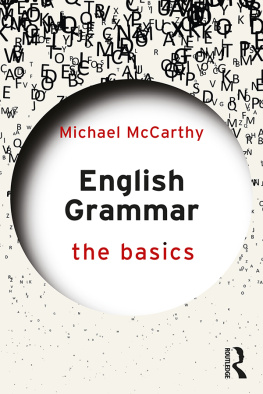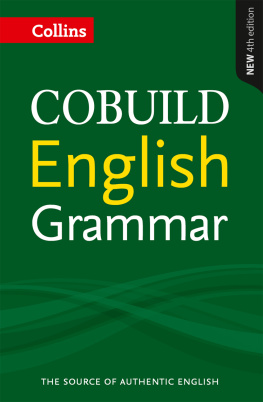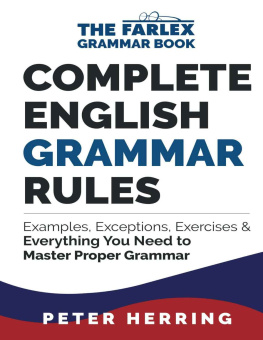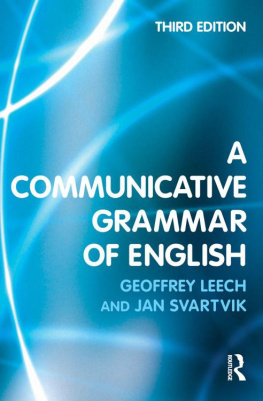Advance Praise for
THE GLAMOUR
of
GRAMMAR
What I learned from this book: (1) That grammar has meant mastery of all arts and letters (to the Greeks) and power, magic, and enchantment (to the Scots). Wow. (2) That for the artful writer, no decision is too small, including whether to use a or the. Awesome. (3) That there are right-branching, left-branching, and middle-branching sentences. How cool! (4) That Roy Peter Clark, a modern-day Pied Piper of grammar, makes good writing both approachable and doable. Phew!
Constance Hale, author of Sin and Syntax
Who, other than a word lover like Roy Peter Clark, would dare link glamour with (ugh) grammar? Here it isa book of enchantment about words and how words work and what they mean and how to spell them, where even lowly semicolons get appreciated as swinging gates in a sentence. Whod a thunk a book on grammar could be fun? And humorous. Check out cleave and cleaveage. Sister Helen Prejean, author of Dead Man Walking
Roy Peter Clark, the Jedi Master of writing coaches, has delivered another indispensable classic for every author, young and old. The Glamour of Grammar crackles with wit and wisdom and with page after page of rock-solid strategies to guide writers toward prose that sings with vivid clarity. Somehow, Clark makes grammar seem both playful and understandable, even for those who have trouble telling the difference between a dangling participle and a wandering antecedent. Thomas French, author of Zoo Story
An indispensable book in this Twitter world, where so few words must push your story forward. Roy Peter Clark shows you a fun way to say exactly what you mean. Bob Dotson, NBC News national correspondent for the Today shows American Story with Bob Dotson
If there is indeed a glamour to grammar, I should have known Roy Peter Clark would be the one to spot it. In his latest book, Clark is a trusty guide for anyone wanting to avoid the (many) pitfalls and scale the (hard-won) peaks of perpetrating prose. To his great credit, he generally avoids the somewhat limited and limiting issue of right or wrong, instead focusing on the essential question for every serious writer: how do I make my words stronger, richer, fresher? And his frame of reference is as wide as the horizon in Big Sky country. Anybody who can (knowledgeably) discuss Frank Sinatras Thats Life and Gerard Manley Hopkinss The Windhover on the same page is okay by me. Ben Yagoda, author of Memoir: A History and The Sound on the Page: Style and Voice in Writing
If grammar is medicine, then Roy Clark gives us the spoonful of sugar to help it go down. A wonderful tour through the labyrinth of language. Anne Hull, Pulitzer Prizewinning reporter, Washington Post
Roy Peter Clark takes the language so seriously, he dares to play with it. What other English professor would seriously write A good pun is its own reword? The Glamour of Grammar is required fun, seriously. Eugene C. Patterson, Pulitzer Prizewinning editor and retired chairman and CEO, St. Petersburg Times
Copyright 2010 by Roy Peter Clark
All rights reserved. Except as permitted under the U.S. Copyright Act of 1976, no part of this publication may be reproduced, distributed, or transmitted in any form or by any means, or stored in a database or retrieval system, without the prior written permission of the publisher.
Little, Brown and Company
Hachette Book Group
237 Park Avenue, New York, NY 10017
www.hachettebookgroup.cm
First Edition: August 2010
Little, Brown and Company is a division of Hachette Book Group, Inc. The Little, Brown name and logo are trademarks of Hachette Book Group, Inc.
Excerpt from The Word Detective by Evan Morris, copyright 2006. Reprinted by permission of Evan Morris.
Excerpt from Mendels Laws from Liquid Paper: New and Selected Poems by Peter Meinke, copyright 1991. Reprinted by permission of the University of Pittsburgh Press.
Excerpt from Semicolon by Maurya Simon, copyright 1991. Reprinted by permission of Maurya Simon. First appeared in A Brief History of Punctuation, published by Sutton Hoo Press.
The letter appearing on page 126 is reprinted by permission of Susan Stanton and family.
Excerpt from Figs from The Complete Poems of D. H. Lawrence by D. H. Lawrence, edited by V. de Sola Pinto and F. W. Roberts, copyright 1964, 1971 by Angelo Ravagali and C. M. Weekley, Executors of the Estate of Frieda Lawrence Ravagali. Used by permission of Viking Penguin, a division of Penguin Group (USA), Inc.
eISBN: 978-0-316-08906-7
To Jane Dystel and Tracy Behar,
my glamorous sisters of the word
Contents


Embrace grammar as powerful and purposeful.
My first rock n roll record, a heavy 78 rpm vinyl disk, was Hound Dog by Elvis Presley. Most of the adults I knew thought that rock was the devils music, the pathway to moral degeneracy and juvenile delinquency. Even worse, they thought it would screw up our grammar. When they heard the King growl You aint nothin but a hound dog, the grown-ups would holler: There aint no such word as aint. Not to mention that double negative: Well, if you aint nothin , then you must be somethin .
Back then, our parents and teachers subscribed to the school of grammar we all learned in, well, grammar school. They framed grammar as a strict set of rules we must master in order to use language correctly. I did not know it then, but this school of grammar had a name. It was called prescriptive because it prescribed proper ways to use the English language.
I was an eighth grader at St. Aidan School in 1961, the year Websters Third included the word aint without disapprovalfor the first time. The conservators of language were outraged, denouncing the dictionary as a glorification of ignorance, and its editors as permissive. But the Websters team was doing nothing more or less than taking note of the way people actually used the language. These lexicographers were members of the descriptive school because they described the language used in spoken and written English.
More than a half century later, the grammar wars rage on, with the prescribers and describers professing antagonistic visions of what constitutes grammar, how it is learned, and how it should be taught. It is in this contentious context that I offer for your consideration The Glamour of Grammar .
If you are holding this book in your hands, it means that the English language lives inside you. That is a wonderful gift, one that many of you learned from the cradle, one that will grow with you until you whisper Rosebud or whatever your final word happens to be. But you have an even greater power at your fingertips. It comes not when your language lives inside you, but when you begin to live inside your language.
To help you live that life, this book invites you to embrace grammar in a special way, not as a set of rules but as a box of tools, strategies that will assist you in making meaning as a reader, writer, or speaker. Living inside the language requires a grammar of purpose, a grammar of effect, a grammar of intent. This type of grammar puts language into action. It doesnt shout at you, No, no, no, but gives you a little push and says, Go, go, go. This type of grammar enables us to practice the three behaviors that mark us as literate human beings: it helps us write with power, read with a critical eye, and talk about how meaning is made.
These reflections lead me to the purpose of this books fabulous title, The Glamour of Grammar . At first glance, the phrase must seem oxymoronic, as paradoxical as a sequined pocket protector. Was there ever in the popular imagination a word less glamorous than grammar? But what if I were to tell you that at one time in the history of our language, grammar and glamour were the same word? Need proof ? Lets consult the Oxford English Dictionary .
Next page
